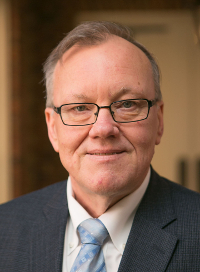 Tim Carter, the David G. Frey Distinguished Professor of Music, was recently named an honorary member of the Royal Music Association in the United Kingdom.
Tim Carter, the David G. Frey Distinguished Professor of Music, was recently named an honorary member of the Royal Music Association in the United Kingdom.
The RMA is the professional association for musicologists in the U.K. and the British equivalent of the American Musicological Society. This recognition puts Carter in an exclusive group in his profession, as there are only five honorary RMA members and none have been appointed since 2014.
“It’s a combination of being both proud and humble,” Carter said. “I had no sense that this was in the cards.”
Carter is one of the foremost experts in 17th-century Italian music, Mozart operas, and American musical theater, and this accolade represents a capstone achievement for a long and esteemed career. Following his studies at the United Kingdom’s University of Durham and University of Birmingham, Carter began his musicology career in the U.K.
“This was back in 1978, and they didn’t even have cassette recorders then, so I used this big reel-to-reel tape to play music examples in my conference papers,” Carter said.
Carter started in academia when he wrote his dissertation on Jacopo Peri, composer of the first operas in Florence around 1600. He then sidestepped into researching operas by W.A. Mozart and then Claudio Monteverdi. Although “Così fan tutte” may not be an obvious link to Rodgers and Hammerstein’s “Oklahoma!,” Carter made those connections.
“They’re about how music works on the stage, and at that point, there is not a great deal of difference between opera and musical theater,” Carter said. “I moved to Carolina [in 2001], and I thought, ‘I’ve moved to a new country. I need to do something that’s closer in spirit to American music.’ I played a lot of these Broadway shows as a cellist in the pit as an amateur, so I knew this repertory.”
Carter began teaching a first-year seminar on Rodgers and Hammerstein at UNC and made a pact with his students.
“I said, ‘I’ll teach you about musical theater if you teach me how to be American,'” he said.
He traveled to the Library of Congress to write a book and, tapping into his skills as an archival archaeologist, found a trove of documents that hadn’t been viewed before. Unlike the 16th-century records he’s used to looking through, the 20th-century Oscar Hammerstein and Richard Rodgers collections are well preserved.
Carter’s career continued in American musical theater with his connection to UNC, where the famous playwright Paul Green once studied and taught. This led Carter to learning about the musical “Johnny Johnson,” which Green co-wrote with Kurt Weill in 1936. However, the play had many issues and Carter describes the debut as “a complete nightmare” and a “total disaster.”
Wearing hats as a writer, manager, arranger, and editor—everything but director—Carter spent seven years reconstructing the original version of “Johnny Johnson,” which premiered at UNC in November 2014.
“I had boxes and boxes of draft scripts, instrumental parts, an orchestral score that had been hacked to pieces, of a group theater version, a Federal Theatre Project version, and all points in between,” Carter said. “I had to take all these documents that were scattered and put them back into some kind of shape to try and get back to what Paul Green and Kurt Weill had originally created.”
Carter has made significant scholarly contributions in American musical theater since he moved to UNC, but his colleagues in the United Kingdom haven’t forgotten his time across the Atlantic. This honor is a testament to his years of academic contributions and service to the RMA.
“I was particularly moved because, having left the U.K, some might have felt that I abandoned the Royal Music Association, which I haven’t, but there’s always that sense of, ‘Well you left, so why do you need to be recognized?'” Carter said. “There’s a feeling of homecoming in a way that people still remember me in the U.K. and pay some attention.”
